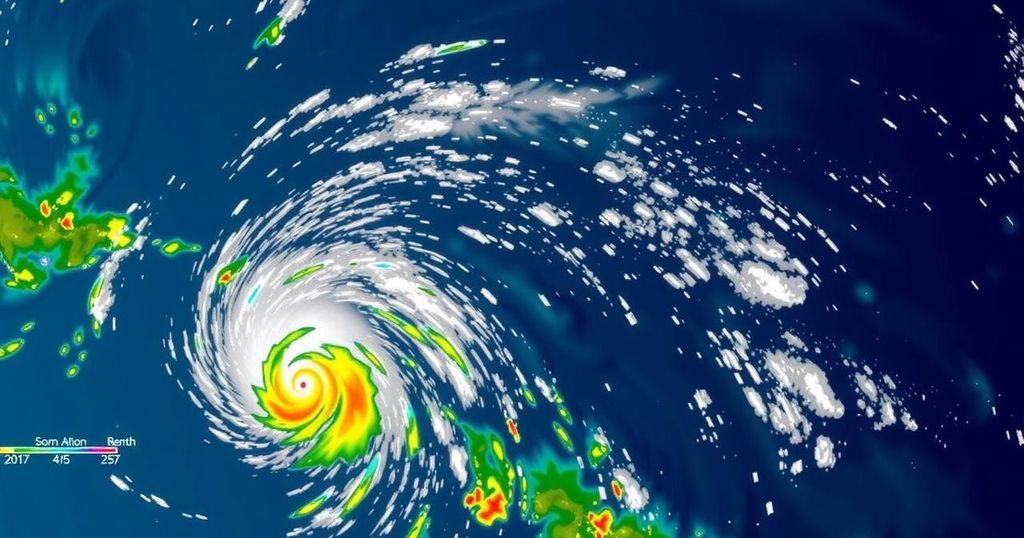Hurricane Oscar Intensifies in Atlantic Amidst Record Heat in Australia

Hurricane Oscar has formed as the tenth hurricane of the 2024 Atlantic season, impacting islands in the Caribbean and expected to affect Cuba and southeastern Canada. Concurrently, Australia is experiencing a significant heatwave, with record high temperatures and severe weather phenomena, including thunderstorms and flooding in several regions.
Hurricane Oscar has emerged as the tenth hurricane of the 2024 Atlantic hurricane season, impacting the Turks and Caicos Islands on the evening of Saturday, October 19, and the southern Bahamas on Sunday. Initially, the system that evolved into Oscar was considered to have a low potential for tropical development by the United States National Hurricane Center. Beginning as a tropical wave on October 10, it produced thunderstorms and gusty winds over the Cabo Verde Islands before advancing westward across the Atlantic. However, its organization was hindered by dry air, which stifled thunderstorm formation. By October 19, as the system neared Puerto Rico, its chances of further development remained slim. Nevertheless, over the next twelve-hour period, the convection became strong enough to warrant classification as a tropical storm, leading to the assignment of the name Oscar. Hurricane hunters later confirmed the presence of hurricane-force winds, prompting the system’s designation as a hurricane. Oscar is anticipated to impact eastern Cuba on Monday and is forecasted to migrate northward, swiftly evolving into a potent extratropical cyclone. This transition may bring wind gusts exceeding 70 miles per hour to select areas in southeastern Canada later in the week. In another area of interest, the remnants of tropical storm Nadine are projected to reconstitute into a new tropical system off the southern coast of Mexico in the coming days. This system is expected to move westward without causing significant land impacts. Concurrently, Australia is experiencing unusually high temperatures for October, following a record-breaking warm August and the fourth warmest September. Many regions in the southern and eastern parts of the continent have recorded daily highs in the high 30s to low 40s Celsius, surpassing the monthly averages by several degrees. Notably, South Australia recorded its highest temperature in nearly three decades, with Coober Pedy reaching 43.7 degrees Celsius. Temperatures in regions of Queensland also soared, exceeding the average by 11 degrees. These elevated temperatures have contributed to several instances of severe weather, particularly across New South Wales and Victoria, where torrential rainfall resulted in flash flooding—one town experienced 50 millimeters of rain within a mere 45 minutes. High winds, large hailstones—some as large as gold balls—and nearly half a million lightning strikes were reported. Looking ahead, a heatwave will migrate across the continent towards the northern regions of Western Australia, where nighttime temperatures are expected to remain no lower than 30 degrees Celsius in specific locations later this week.
The article discusses the recent developments concerning Hurricane Oscar, the tenth hurricane of the 2024 Atlantic season, as it progresses through the Caribbean, affecting islands such as the Turks and Caicos and the southern Bahamas. The article provides a historical context of Oscar’s formation, detailing its origins and classification details. Additionally, the piece contrasts these weather developments with current temperature extremes being observed in Australia, showcasing the effects of climate conditions across different regions of the world. The overall narrative emphasizes the changing weather patterns, the potential consequences of the storm, and the heatwave impacting Australian states, illustrating the diverse and sometimes extreme nature of contemporary weather phenomena.
In conclusion, Hurricane Oscar has rapidly intensified into the tenth hurricane of the current Atlantic season, significantly impacting the Turks and Caicos Islands and soon affecting Cuba. As it continues to develop, it is projected to bring severe weather conditions to southeastern Canada. Meanwhile, Australia is grappling with record-high temperatures and severe weather events, illustrating the varying impacts of climate across the globe. These occurrences highlight the increasingly volatile nature of weather patterns worldwide.
Original Source: www.theguardian.com






